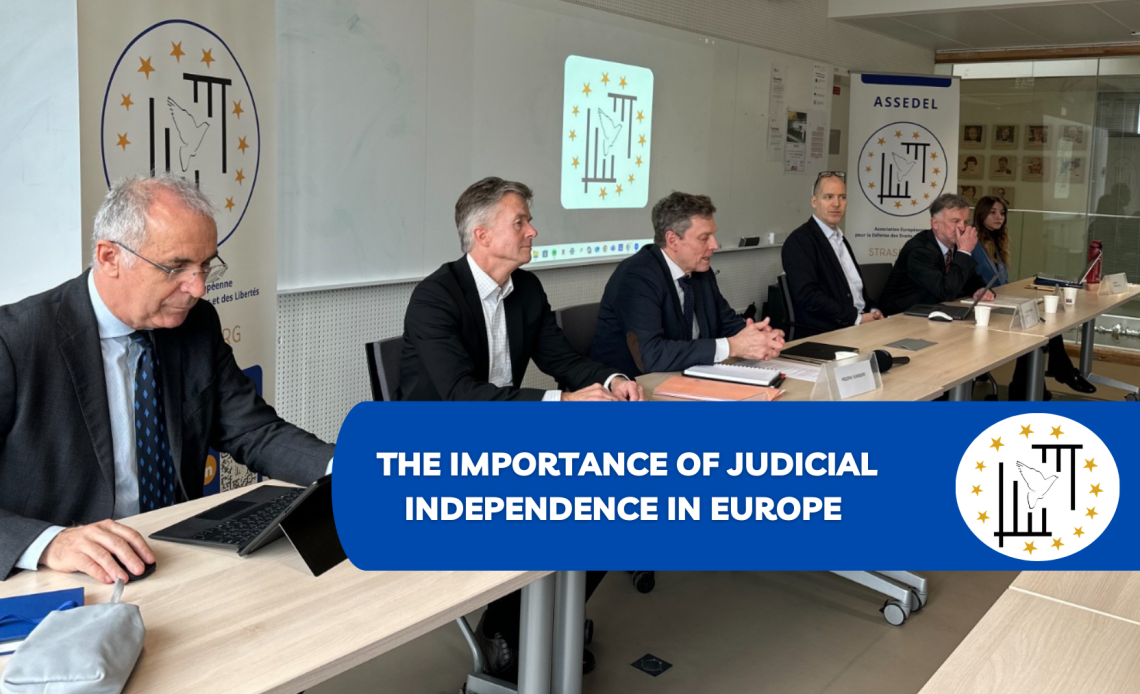On Monday 17th February 2025, ASSEDEL hosted a crucial conference in the Science Po Strasbourg on the state of judicial independence across Europe, featuring distinguished guests such as Ledi Bianku – Former Judge of the European Court of Human Rights, Fredrik Sundberg – Former Chief of the Department for the Execution of the European Court of Human Rights, Dr. Kadar Andras Kristof – Co-chair of the Hungarian Helskinki Committee, Professor Ireneusz C. Kaminski – Institute of Law Studies, Polish Academy of Sciences, Prof Veronika Fikfak – Co-director of the UCL Institute for Human Rights and Dr. Jesper Wittrup – International consultant, Metiri Consult. Leading experts in the fields of law, economics, and human rights gathered to discuss the state of judicial independence in Europe. The discussions centered around two key case studies – Yalçınkaya v. Türkiye and Baka v. Hungary.
The recent high-profile conference has shed critical light on the pressing challenges facing judicial independence in parts of Europe, amid growing concerns over democratic backsliding in the region. Two key case studies – Yalçınkaya v. Türkiye and Baka v. Hungary – have highlighted the ongoing threats to the rule of law and the urgent need for concerted action to protect this fundamental pillar of a healthy democracy.
The Yalçınkaya case exposed the widespread and systematic misuse of anti-terror laws in Türkiye, leading to the arbitrary detention of over 100,000 individuals. This disturbing trend is indicative of the democratic backsliding occurring in the country, where the “winner takes it all” mentality has taken hold, undermining the protection of all parts of society under the rule of law. In its ruling, the European Court of Human Rights found serious violations of the principle of legality, emphasizing the importance of foreseeability and due process in the application of criminal law. This case serves as a stark reminder of how the selective and politicized application of the law can erode the foundations of an independent judiciary.
In the Baka v. Hungary case, the ECtHR delivered a strong rebuke to the Hungarian government’s attempts to stifle judicial freedom of expression as part of its broader efforts to consolidate power and dismantle checks and balances. The court found that the government had used constitutional changes to dismiss an experienced and outspoken judge, András Baka, who had served as the president of Hungary’s National Judicial Council. By removing Baka and replacing him with more pliable appointees, the Hungarian authorities effectively quashed the ability of judges to publicly voice concerns about threats to judicial independence. The ECtHR’s ruling affirmed that judges must be allowed to participate in public debates on legislative reforms affecting the judiciary, as this is not only their right, but also their duty in the face of democratic backsliding.
Experts at the conference warned of the “contagion” effect, where the corrosive practices employed by certain governments to undermine judicial independence can spread to other countries if left unchecked. They emphasized the crucial role of judicial independence in building social trust, which is a key factor in the success of mid-sized companies and the broader economic development of a country. Citing robust empirical evidence, the experts highlighted the strong linkage between the rule of law, including judicial independence, and economic growth, underscoring the high stakes involved in the fight against democratic backsliding.
The protection of judicial independence remains an urgent priority in parts of Europe, as the erosion of this cornerstone of democracy threatens to unravel the very foundations of the European project. As guardians of the rule of law, we must continue to vigilantly defend this fundamental pillar of a healthy democracy. Only through a steadfast commitment to upholding the independence of the judiciary can we ensure the continued prosperity and stability of our European institutions and safeguard the rights and freedoms of all citizens.
The conference has served as a clarion call, underscoring the need for renewed vigilance and collective action to address the erosion of judicial independence in certain European countries amid the worrying tide of democratic backsliding. By learning from the lessons of Yalçınkaya and Baka, and by reinforcing the crucial importance of an independent judiciary for both democratic governance and economic development, we can work to strengthen the resilience of our judicial systems and protect the core values that underpin the European project.
To read the content of the material presented by András Kádár: Judicial independence and freedom of judicial expression in illiberal systems – the Hungarian example, click here.
On the topic Judicial Independence and Economic Growth, Games, History and Empirical Evidence, presented by Jesper Wittrup, click here.
To read the full transcription of the conference on The Importance of Judicial Independence in Europe in the Light of Two Case Studies: Yalcinkaya v. Türkiye and Baka v. Hungary, held on 17th February 2025 in Strasbourg, click here.

